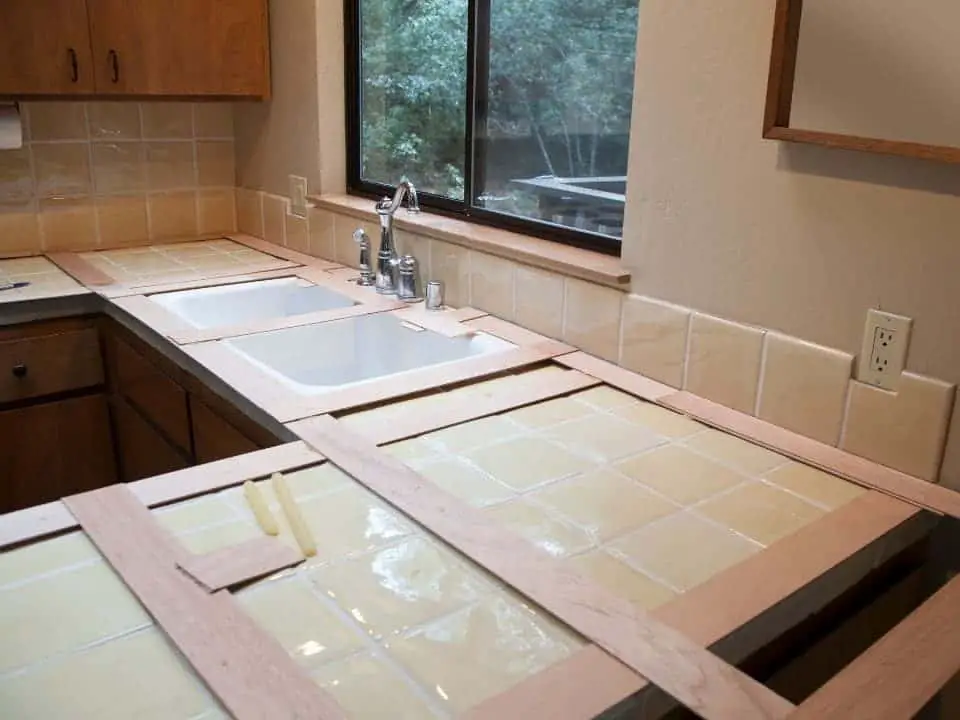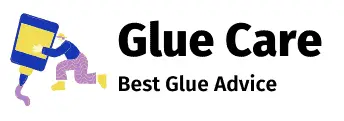The word “gorilla glue” can be intimidating, but don’t worry- it’s not as scary as the name suggests. Gorilla Glue is a powerful adhesive that is great for any project you might have in mind (so long as the surface you are applying it to isn’t porous). But what do you do when gorilla glue ends up where it shouldn’t? This blog post will discuss how to remove gorilla glue from the countertop.

- Steps to remove gorilla glue from countertop
- Conclusion
- Frequently Asked Questions
Steps to remove gorilla glue from countertop
1. Clean the Gorilla Glue with hot soapy water
This first step will help remove any leftover excess glue that you don’t want to remove.
- Use hot soapy water and a rag or sponge to remove the gorilla glue from countertop.
- You might need some elbow grease for this step, but it is necessary in order to move on with your task of removing the adhesive.
2. Apply solvent to the spot where you want to remove the glue
There are several choices of solvent for you to choose. Based on what you already have and how hard the glue stain is, you can the methods below:
2.1.Petroleum jelly
It leaves the glue in a waxy form that can be scraped away. To remove the glue stain, apply petroleum jelly to the spot and let it sit overnight. The next day, remove the petroleum jelly with a rag or other piece of fabric and wipe away any remaining glue residue.
2.2. WD-40
You can also use WD-40 for this method if you don’t have petroleum jelly on hand. It leaves behind an oily film that needs to be wiped off after sitting overnight as well but should remove at least some of the gorilla glue stain.
2.3. Alcohol
Pour rubbing alcohol onto a cotton swab and rub into the affected area until most (if not all) of the solvent has been absorbed by your countertop’s surface.
Do not apply too much pressure while doing so; simply allow gravity to do it! After letting it set in for about ten minutes, remove excess solvent with a rag or other clean cloth
2.4. Vinegar
It helps remove grease and leaves no residue, but it may discolor some surfaces (like wood). How to use it? Just pour vinegar onto the affected area and remove excess after letting it sit for a few minutes (you can use paper towels or something similar to remove the adhesive)
2.5. Salt
Pour salt into an empty bowl (make sure there is plenty) then add just enough water so that all of the salt has been moistened but not saturated.
Use your finger to rub in circular motions over where you have spilled gorilla glue on your countertop until most of it has disappeared!
After this step, wipe away any remaining residue with a rag.
2.6. Ammonia
Ammonia will remove ink stains with ease, but you need to ensure there are no remnants of ammonia after cleaning up. Be sure to test on an inconspicuous area first if this is your plan!
2.7. Acetone
To remove Gorilla Glue from Countertop using acetone, remove excess adhesive with a rag, then pour acetone onto the affected area and remove after several minutes.
2.8. Vegetable oil or cooking oil
Once again remove excess adhesive with a rag, then pour vegetable oil onto the affected area and remove after several minutes.
If you have not already done so during your task of removing gorilla glue from the countertop, be sure to clean up any leftover residue as soon as possible! This will help ensure that it does not set into your surface and become much harder to remove later on.
You can also use hot water or dish soap if nothing else is available (although they may not do anything at all). Just let the spot soak in either for about five minutes before wiping away any remaining residue with a rag. By now most of the gorilla glue should have disappeared- but depending on how long ago it was applied and what kind of wood.
2.9. Citrus oil
Mix with water then pours over your countertop’s surface to remove any remaining adhesive.
You can also use just straight citrus essential oils for this method if you would rather not dilute them! The acid in these oils is what helps remove gorilla glue from the countertop- it works best on marble or stone surfaces that aren’t porous, but could work on other types of counters as well (just test first!).
2.10. Hair spray
Just like cooking oil, cover the spot where you spilled gorilla glue on your countertop with some hair spray before wiping away after several minutes. This should remove most of the leftover residue from your kitchen tabletop!
3. Repeat if necessary
If needed, you can repeat steps one and two as many times as necessary to remove Gorilla Glue on Countertop completely.
Be sure to let solvent sit for at least ten minutes before wiping up with a rag or cloth. You can also use paper towels if that’s what you have available- just be careful not to damage the finish of your kitchen tabletop while doing so!
And be sure not to let anything dry on top of the glue before removing it!
4. Use a razor blade scraper or putty knife if needed
For globs of gorilla glue, you may have to scrape it off using a razor blade scraper or putty knife. Use this tool to remove as much adhesive as possible without causing damage to your countertop!
5. Try some tips to protect your countertop from future spills and stains
After all traces of gorilla glue are gone, apply an oil-based sealant like Polyurethane or polyacrylic (water-based) to protect your countertop from future spills and stains
Use an oil-based cleanser like mineral oil on kitchen surfaces before applying polyurethane finish if you have marble countertops – this will create a sealant between the stone surface and the polyurethane so stains can’t penetrate it.
Also, keep a small towel next to the stove and wipe up spills as they happen.
Conclusion
We hope this article has been helpful. If you know of any other methods that work well, please share them in the comments below!
Frequently Asked Questions
How do you get super glue off of a laminate countertop?
In general, it is best to be as careful as possible when working with glue on a laminate or natural stone surface. If you find that the glue has dried and hasn’t been scraped off the countertop, use a hard scraper (or razor blade) to remove as much of the dried residue as possible, and then use mineral spirits to dissolve any residual traces. Do not scrub too vigorously if you suspect there’s some chemical reaction going on- we recommend doing so carefully and nervously for safety reasons!
How do you remove Gorilla Glue from granite countertops?
The best thing to do is determine where the glue has leaked and remove it using a dry cotton swab. Afterward, use your fingers or hand sander to scratch off any remaining adhesive. From there you will need an acrylic sealant product to re-preserve the damaged area so that it may be used again safely.
The most common reason for granite countertops cracking is contact with water that has held onto things like soap scum, oils, dirt particles, and food build-up without being properly washed away prior to drying out again. Although the appearance of this type of crack does not harm the aesthetic value of the countertop surface it does create risks for more serious cracks if deep pitting occurs by providing places for water molecules
How do you get Gorilla Glue off of quartz countertops?
Gorilla Glue is made of protein resins that are derived from plants. To get Gorilla Glue off of quartz countertops, use either 3M Adhesives Stickies or peanut butter to help break the bond.
Generally speaking, the best way to clean up any spilled glue is with a one-to-one mixture of water and dish detergent in order to loosen up the glue. However because this may not be enough for Gorilla Glue in particular (which might still be difficult for consumers to remove after it’s dried), then adding some peanut butter into the mix should provide enough lubrication for consumers to then scrape away afterward.
Can you use Goo Gone on granite?
Goo gone may not be the most effective at removing tough stains from granite, and it can actually damage the finish.
If you don’t want to risk damaging your expensive counters, we would recommend using something like citric acid instead. Citric acid is an organic compound that chemically breaks down protein, which is what makes up most stains (blood, mustard). It’s often sold in grocery stores as a lemon juice ingredient for recipes and does wonder when mixed with water. If none of these options work for you, there are pros in your area who offer professional stone cleaning services and will know exactly what to do to get your counters back looking beautiful.
